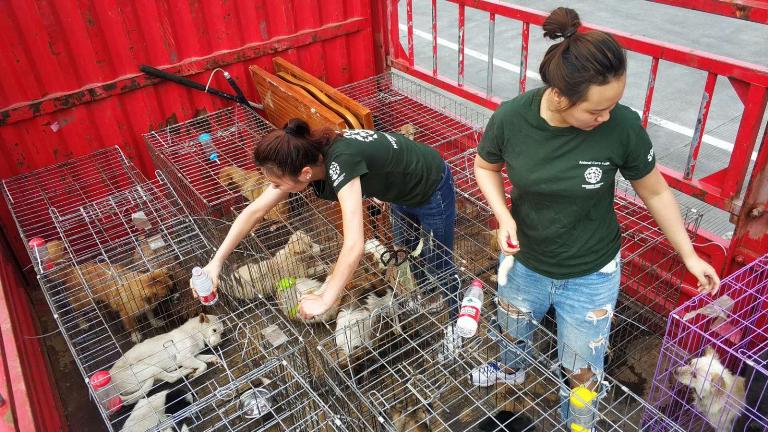
Shenzhen First Chinese City to Ban Eating of Dogs, Cats and Wildlife
Shenzhen has passed a groundbreaking law to ban the consumption and production of dog and cat meat, the first city in China to do so. The ban – which also addresses the wildlife trade – has been welcomed by longtime anti-dog meat trade campaigners Humane Society International as a watershed moment in efforts to ban […]

Shenzhen has passed a groundbreaking law to ban the consumption and production of dog and cat meat, the first city in China to do so. The ban – which also addresses the wildlife trade – has been welcomed by longtime anti-dog meat trade campaigners Humane Society International as a watershed moment in efforts to ban the trade across China.

HSI
Shenzen, with a population of over 12 million, is China’s fifth largest city and is on the mainland facing Hong Kong. In February the Chinese government announced tougher new measures against trade in wildlife, after reports linked the outbreak of Coronavirus to a meat market in Wuhan, China.
Unlike the temporary ban on wildlife markets and consumption passed by the national government, Shenzhen’s ban is a permanent prohibition on the consumption, breeding and sale of wildlife such as snakes, lizards, and other wild animals for human consumption, with heavy fines of up 150,000 yuan. The food safety legislation (Shenzhen Special Economic Region Regulation on a Comprehensive Ban on the Consumption of Wild Animals) proposed in February by Shenzhen legislators, comes into effect on 1 May.
An unrelated ban on the consumption of “pet” animals was also included, an acknowledgement of their status as companion animals.
“(D)ogs and cats as pets have established a much closer relationship with humans than all other animals, and banning the consumption of dogs and cats and other pets is a common practice in developed countries and in Hong Kong and Taiwan,” a spokesperson for the Shenzhen government said. “This ban also responds to the demand and spirit of human civilization.”
To further underpin that, the law clarifies those species permitted to be consumed (pig, cattle, sheep, rabbit, chicken etc, with dogs and cats noticeably absent). Therefore, from May 1, the sale of cats and dogs for human consumption will now be banned in restaurants and stores throughout Shenzhen, and sale of live cats and dogs for consumption will be banned in markets.
Dr Peter Li, China policy specialist for HSI, said “This really could be a watershed moment in efforts to end this brutal trade that kills an estimated 10 million dogs and 4 million cats in China every year.”
The majority of these companion animals are stolen from people’s back yards or snatched from the streets, and are spirited away on the backs of trucks to be beaten to death in slaughterhouses and restaurants across China.
Most people in China don’t eat dog or cat meat, and there is considerable opposition to the trade particularly among younger Chinese. Although World Health Organisation advice is clear that dogs and cats pose no known Coronavirus threat whatsoever, it’s no surprise that attention is turning to this trade at this time because it undoubtedly poses a huge human health risk for other diseases such as rabies, as well as causing immense animal suffering.”
Dr Teresa M. Telecky, vice president of the wildlife department for Humane Society International, said: “Shenzhen is the first city in the world to take the lessons learned from this pandemic seriously and make the changes needed to avoid another pandemic. People around the world are suffering the impact of this pandemic because of one thing: the wildlife trade. Shenzhen’s bold steps to stop this trade and wildlife consumption is a model for governments around the world to emulate. We urge all governments to follow suit by banning wildlife trade, transport and consumption for any purpose.”
Facts about China’s dog meat trade
- Thirty million dogs a year are killed across Asia for meat. There are estimated to be more than 91.49 million dogs and cats kept as pets in China. An estimated 10 million dogs a year are killed for China’s dog meat trade.
- The World Health Organisation warns that the dog trade spreads rabies and increases the risk of cholera.
- Most people in China don’t eat dogs, in fact dog meat is only eaten infrequently by less than 20 percent of the Chinese population. A 2017 survey revealed that even in Yulin, home of the notorious dog meat festival, most people (72 percent) don’t regularly eat dog meat despite efforts by dog meat traders to promote it. Nationwide across China, a 2016 survey conducted by Chinese polling company Horizon, and commissioned by Chinese group China Animal Welfare Association in collaboration with Humane Society International and Avaaz, found that most Chinese citizens (64 percent) want to see an end to the Yulin festival, more than half (51.7 percent) think the dog meat trade should be completely banned, and the majority (69.5 percent) have never eaten dog meat.
